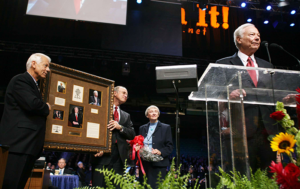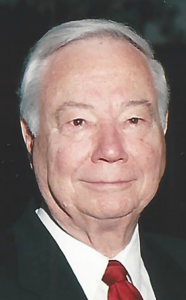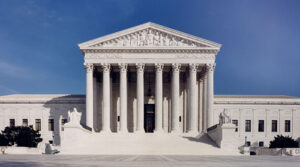Nashville attorney has spent lifetime helping entities preserve stewardship integrity
By Lonnie Wilkey
Editor, Baptist and Reflector
lwilkey@tnbaptist.org

Jim Guenther was honored for his service to the Southern Baptist Convention in 2006. He began serving as general counsel for the Southern Baptist Convention in 1966. Shown with him were, from left, former SBC president Bobby Welch, Augie Boto, formerly of the SBC Executive Committee staff, and Guenther’s late wife, Patsy Guenther. — Photo courtesy of the Southern Baptist Convention Historical Library and Archives
FRANKLIN — Mention the name Jim Guenther to any Southern Baptist who sits on the pew of an average Southern Baptist church across the nation and you will probably get a blank look.
Few people know the name of the Nashville attorney who has spent the better part of seven decades protecting the interests of Southern Baptists. And, what’s more, he prefers it that way. “Southern Baptists don’t need to remember me. Our work is primarily done in the wings,” he said.
Guenther laughs about an encounter he had at an annual meeting of the Southern Baptist Convention more than 30 years ago. He was standing in line for food behind a couple and the lady asked if he was a minister. Guenther replied that he was a lawyer.
The lady asked why a lawyer was attending the annual meeting and he replied that he was the attorney for the SBC. He remembers that she turned to her husband and said, “What has the convention come to that it has to have a lawyer?”
A native of Arkansas, Guenther has been a Southern Baptist all his life, and actually began working for the former Baptist Sunday School Board (now Lifeway Christian Resources) in the late 1950s while attending law school at Vanderbilt University in Nashville.
After graduating and passing his state bar exam, Guenther served as legal and financial officer for the BSSB from 1958-66 when he went into private practice and became general counsel for the Southern Baptist Convention.
He has looked out after the legal interests of Southern Baptists ever since.
His firm provides legal counsel and advocates on behalf of the SBC and its officers and committees, including the Executive Committee. Guenther and his firm also have represented many state Baptist conventions, including the Tennessee Baptist Mission Board and the Tennessee Baptist Convention, and state convention institutions.
Guenther, who will be 88 in December, has seen many changes related to law and religious institutions over the decades that have passed. He noted that when he first joined the Baptist Sunday School Board, religious organizations mostly were immune from lawsuits.
Now, litigation is a common occurrence, the Nashville attorney observed. “We have moved from a time of immunity and exemptions to a time of being held accountable and being subject to regulation by government.”
Guenther recalled that he has attended almost every annual meeting of the convention except for three or four since 1958. He remembers his first annual meeting while serving as the attorney for the BSSB and there was some controversy about property that the board intended to buy.
He noted that James L. Sullivan, then president of the BSSB who would later serve as president of the convention and author a book on Baptist polity (Baptist Polity As I See It), put an arm around Guenther and told him, “Don’t let it get you down.”
“That was my introduction to annual meetings,” he said.
A major change occurred in the role of attorneys in religious life after the passage of the Civil Rights Act of 1964, he noted.
“We never had nondiscrimination laws in this country so there was considerable turmoil in Washington about whether it was even constitutional to apply nondiscrimination laws to churches and religious organizations.”
 While Guenther would say he is not an expert on Southern Baptist history, he has lived it firsthand. He is, however, an authority on Baptist polity.
While Guenther would say he is not an expert on Southern Baptist history, he has lived it firsthand. He is, however, an authority on Baptist polity.
When Sullivan revised his book on Baptist polity in 1998, Guenther was invited to confer with him.
Guenther’s own writing includes contributing to Ascending Liability in Religious and Other Nonprofit Corporations, published by the Center for Constitutional Studies and Mercer University Press in 1984, and authoring Memorandum on Ascending Liability, published by the SBC Executive Committee in 1985.
For 63 years, Guenther has interpreted Southern Baptist polity and structure to state and federal agencies and courts, including the United States Supreme Court. He regularly defends the SBC and state conventions (including Tennessee) in cases brought against them. The cases involve efforts by plaintiffs to hold conventions liable for alleged wrongs which occurred in churches.
Because Southern Baptists are not hierarchical, and the convention does not control churches, Guenther and his firm have never lost an ascending liability suit. He estimates that he has had approximately 50 of those cases over the years.
Guenther issued a word of caution, however, for Southern Baptist entities. “We have got to always be diligent that we practice what we preach and conventions need to take care to respect what the Baptist Faith and Message says about local church autonomy,” he stressed.
While not a historian per se, Guenther has lived and counseled convention leadership during the peak moments and through periods of controversy. He noted that “the controversies in the convention have not really affected my work because they did not touch on legal subjects.”
And, while the Conservative Resurgence, which was seen as a battle between moderates and conservatives, is perhaps best known among current Southern Baptists, it is just one of many, Guenther said.
“There have always been factions among Southern Baptists. What divided Southern Baptists from our very beginnings might have been different, but when one looks at the history of Southern Baptists there have always been controversies. And, we have weathered those disputes.
“I think that cooperation, which is entirely voluntary, depends on Baptists having trust in the institutions and the leadership of the convention. Controversies endanger that trust but Southern Baptists have historically gotten through those divisions and moved forward,” he said.
Guenther acknowledged he had friends on both sides of the Conservative Resurgence and that it was uncomfortable, but he never allowed that to become an issue. “I have approached my role as an attorney in a professional manner and I’m not asked to advise Baptists on things other than legal matters.
“So, I feel that I fulfilled my professional responsibility by being objective and not becoming partisan so my clients can know that my only motivation is what I deem to be in their best interests.”
During this year’s annual meeting in Nashville, a messenger raised the question whether the attorney for the SBC Executive Committee should also be the attorney for the Southern Baptist Convention because it could represent a conflict of interests. The motion was referred to the Executive Committee.
“Whether it should be the same lawyer is a matter for someone else to decide,” Guenther observed, “but professionally I do not see it as a conflict of interests.
“The goals and interests of the Southern Baptist Convention and the Executive Committee are identical,” he said.
He added that the president of the Executive Committee serves as the treasurer of the SBC and the SBC president is a director of the Executive Committee. In addition, he continued, “the Executive Committee is the sole agent of the SBC in all its affairs that are not otherwise assigned when the messengers are not in session.”
As Guenther reflected on his career, he takes satisfaction in that he has worked “with some mighty fine people who were trying to do some good things.”
He also noted that there is a stewardship element to what he has done over the years.
There is nothing new about Southern Baptist entities being sued, observed Guenther, who is a member of First Baptist Church, Nashville.
“Our responsibility as lawyers is to help Baptist institutions and conventions to understand the law so that they can conform to it and assisting our clients with risk management.
“With ministry comes legal risks and Southern Baptists give their money to Southern Baptist ministries for those causes, not to pay judgements for wrongs committed by those institutions,” he said.
“So, a lot of our work is designed to maintain the stewardship integrity and help our clients not act in ways which will violate the rights of others and result in judgements against the institution.”
Randy C. Davis, president and executive director of the Tennessee Baptist Mission Board, has known Guenther for more than three decades. “No one has served Southern Baptists with greater integrity or competence,” Davis said.
“He is the epitome of a Christian gentleman and he is wise and thoughtful. Jim’s knowledge of the law and Baptist polity has been an invaluable resource for good decision making in a complicated world for the TBMB and its leadership. I am so thankful for our good friend,” Davis added. B&R


